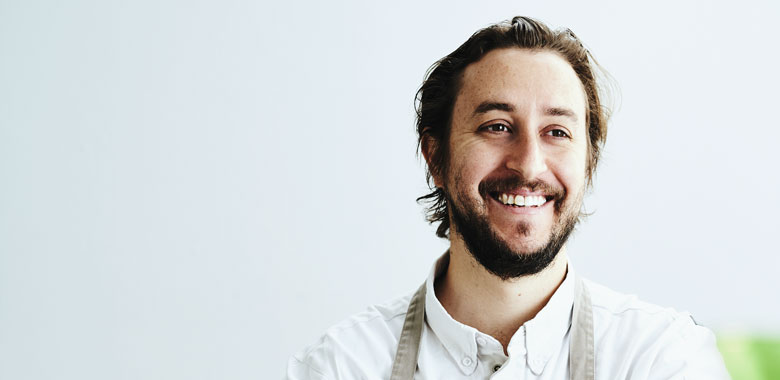
Food
Impress: Daniel Puskas
Over the past six years, Sixpenny, found on a humble street corner in the inner-west suburb of Stanmore, has become one of Sydney’s favourite restaurants, and for good reason. The food, served as a six- or eight-course menu, is exquisite, the wine list a delight and the sunshine that streams in the windows on a Sunday afternoon is entirely ethereal. It is a beautiful place to dine.
The fact it’s named after sixpenny restaurants, small diners that populated Australian cities in the gold rush era of the late 1800s, where you could get a ‘square meal’ for just sixpence, speaks volumes about its identity. The title was the perfect middle ground for co-founders and chefs, Daniel Puskas and James Parry; it was not as simple as the fourpenny restaurant, not as fancy (or expensive) as their ‘posh cousins’, the shilling restaurant.
Since James’ departure two years ago, Daniel has headed up the kitchen (and run the restaurant) alone. Moulded by many years of experiences and friendships, as most creatives are, he has carved out his own culinary niche. A very successful niche. He was awarded the 2018 Good Food Guide’s Chef of the Year, with the restaurant consistently praised for its modern simplicity.
“Over the years I have learnt I want to keep it simple but elegant,” says Daniel of his cooking and plating. “I don’t think it has to look a particular way, it just has to taste delicious. Some people eat with their eyes, but people who really taste the food, will see beyond it.”
Life lessons
For most successful chefs, it is the time at someone else’s apron strings that creates their style. For Daniel, it was discovering what he didn’t want that taught him valuable lessons.
It was an early start in hotel restaurants and function rooms that gave him the impetus to seek out something different, and so, in 2000, he bought a copy of the Good Food Guide, found the best restaurant on the list and applied for a job. The restaurant was Tetsuya’s.
At this revered hot bed of Australian talent, Daniel not only worked under the inimitable Tetsuya Wakuda, but also Martin Benn, who was head chef at the time before going off to open the amazing Sepia, Dave Pegrum as sous chef, and a veritable line-up of Australia’s best talents toiling away as chef de parties and apprentices. He had landed well.
“There was a great bunch of people in the kitchen and on the floor” recalls Dan. “Tets was always in and out of the kitchen. He brought an energy. ‘Taste, taste, taste’ was his mantra and that’s stuck with me.
“But in the end, it was about working in a fine dining restaurant. With so many people you were not doing a magnitude of jobs, rather a large quantity of small jobs.”
New world views
Like many chefs of his generation, Daniel chose London to expand his culinary horizons. However, the combination of long hours and long drinking sessions, curtailed any real creative stimulation.
Rather, it was time spent in Spain, Italy and Jerusalem that gave Dan food awakening moments. Living in Jerusalem for five months was a change of pace.
He started to learn Hebrew and would practise while bartering in the souk and buying his groceries for dinner.
Making his way back to Sydney, he found himself in another highly acclaimed kitchen, Marque. While learning from another incredible line up of chefs, he also mastered how to cook in a tiny kitchen, work in a smaller team and multi-task.
While at Marque, he won the prestigious Josephine Pignolet Award, which provides one young chef each year the financial support to travel. Daniel took off again. This time to America, and into the kitchens of cutting-edge restaurants WD50 and Alinea. Again, an awakening.
“I learnt a lot of how I didn’t want to cook,” says Dan of his journey. “I thought I needed to learn all the modern techniques. In fact, it taught me that I didn’t want too much of that in my kitchen.”
An Australian identity
Back home, Daniel teamed up with James Parry for the first time at Oscillate Wildly in the Sydney suburb of Newtown. It was another growth moment.
“James’s training had been at Bird Cow Fish and Billy Kwong. He had a very different approach to cooking,” says Dan.
“He had the skills to make food delicious, where I was trained on how to work in a kitchen. I started to feel I had so much more to learn, again. But I think he found that balance in me, too. So we decided to create something together and Sixpenny was born.”
With this delightful suburban restaurant, Dan has carved out his own identity in the heart of Australia’s culinary landscape. It is somewhat to be expected, given his stunning pedigree. Although he calmly tempers that fact.
“It’s about relationships, the people, not the resume,” he says. “We’re only a small restaurant, but we all have big dreams.”
A bit like those folk who ate at the original sixpennys all those years ago.